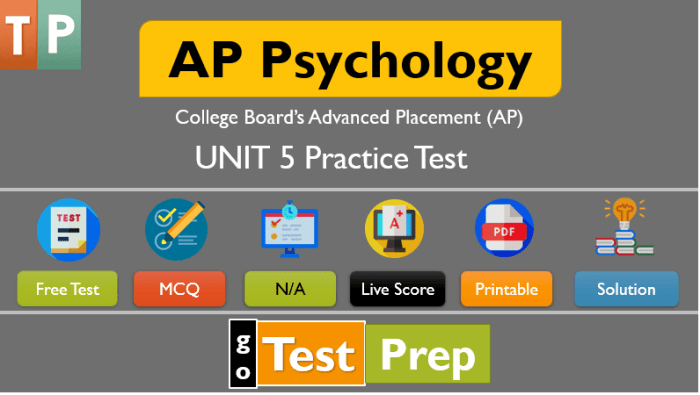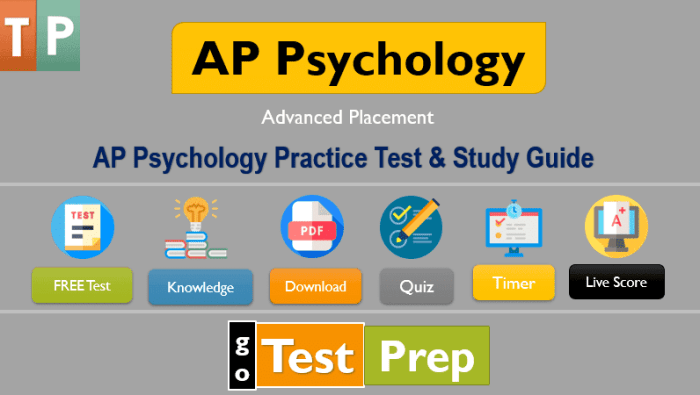Get ready to conquer the AP Psychology Unit 5 test with this comprehensive guide! Delve into the fascinating world of psychological concepts, research methods, statistical analysis, and practical applications. Discover how psychology shapes our understanding of human behavior and empowers us to solve real-world problems.
This guide will equip you with the knowledge and strategies you need to excel in the AP Psychology Unit 5 test. Dive in and unlock the secrets of psychology!
Unit 5 Test Overview

The AP Psychology Unit 5 test assesses students’ understanding of the following topics:
- History and Approaches to Psychology
- Research Methods
- Biological Bases of Behavior
- Sensation and Perception
- States of Consciousness
History and Approaches to Psychology
This section covers the history of psychology, including major figures and theories, as well as the different approaches to studying psychology, such as the psychodynamic, behavioral, cognitive, and humanistic approaches.
Research Methods
This section covers the different methods used to conduct psychological research, including experimental, correlational, and observational methods, as well as the ethical guidelines for conducting research with human participants.
Biological Bases of Behavior
This section covers the biological structures and processes that underlie behavior, including the nervous system, endocrine system, and genetics.
Sensation and Perception
This section covers the processes of sensation and perception, including the different senses, how they work, and how the brain interprets sensory information.
States of Consciousness
This section covers the different states of consciousness, including sleep, dreaming, hypnosis, and meditation, as well as the factors that influence these states.
Key Concepts and Theories
Unit 5 delves into the fundamental concepts and theories that form the backbone of psychology. These theories provide a framework for understanding the complexities of human behavior, offering insights into our thoughts, emotions, and actions.
The AP Psychology Unit 5 test is approaching, and students are looking for resources to help them prepare. One such resource is a comparison of ASTM D698 and ASTM D1557 , which can provide insights into research methods and data analysis techniques.
Understanding these concepts can enhance students’ comprehension of the material covered in Unit 5, enabling them to perform well on the upcoming test.
One of the key theories explored in this unit is the biopsychosocial model, which emphasizes the interplay between biological, psychological, and social factors in shaping human behavior. This model acknowledges the influence of genetics, brain structure and function, personality traits, and social environment on our thoughts and actions.
Behavioral Theories
Behavioral theories focus on the observable aspects of behavior and emphasize the role of learning in shaping our responses to the environment. Key concepts within this perspective include classical conditioning, operant conditioning, and social learning theory.
- Classical conditioning: This theory, developed by Ivan Pavlov, explains how we learn to associate stimuli with specific responses through repeated pairings.
- Operant conditioning: Proposed by B.F. Skinner, this theory suggests that behavior is shaped by its consequences, with rewards increasing the likelihood of repetition and punishments decreasing it.
- Social learning theory: This theory, proposed by Albert Bandura, emphasizes the role of observation and imitation in learning new behaviors.
Cognitive Theories
Cognitive theories focus on the mental processes involved in perception, thinking, memory, and problem-solving. These theories emphasize the role of schemas, mental representations of the world, in shaping our experiences and behavior.
- Schema theory: This theory, proposed by Frederick Bartlett, suggests that we organize and interpret information based on our existing knowledge and experiences.
- Cognitive dissonance theory: This theory, proposed by Leon Festinger, explains how we experience psychological discomfort when our beliefs and behaviors conflict, leading us to change either our beliefs or actions.
- Attribution theory: This theory explores how we explain the causes of our own and others’ behavior, often attributing it to internal or external factors.
Psychodynamic Theories
Psychodynamic theories emphasize the role of unconscious processes, childhood experiences, and interpersonal relationships in shaping personality and behavior. These theories focus on the interplay between the id, ego, and superego, as well as defense mechanisms.
- Psychoanalytic theory: This theory, developed by Sigmund Freud, proposes that personality is shaped by unconscious conflicts and early childhood experiences.
- Object relations theory: This theory, proposed by Melanie Klein and others, emphasizes the importance of relationships with primary caregivers in shaping personality development.
- Ego psychology: This theory, proposed by Anna Freud and others, focuses on the role of the ego in mediating between the id and superego, as well as in adapting to reality.
Humanistic Theories
Humanistic theories emphasize the innate goodness of humans and focus on personal growth, self-actualization, and free will. These theories view individuals as capable of change and growth throughout their lives.
- Humanistic psychology: This theory, proposed by Carl Rogers and others, emphasizes the importance of self-acceptance, empathy, and unconditional positive regard.
- Existential psychology: This theory, proposed by Jean-Paul Sartre and others, explores the themes of freedom, responsibility, and the meaning of life.
- Positive psychology: This theory, proposed by Martin Seligman and others, focuses on the study of strengths, resilience, and well-being.
Research Methods

Research methods are the tools that psychologists use to gather information about human behavior and mental processes. There are a variety of research methods, each with its own strengths and limitations.
The most common research methods used in psychological studies are:
- Observational methods
- Survey methods
- Experimental methods
Observational Methods
Observational methods involve observing and recording behavior without directly intervening. This can be done in a variety of settings, such as in a laboratory, in a natural setting, or online.
Observational methods can be used to study a wide range of behaviors, including social interactions, nonverbal communication, and animal behavior.
Strengths
- Observational methods are relatively unobtrusive, so they do not interfere with the behavior being studied.
- Observational methods can be used to study behavior in natural settings.
- Observational methods can provide a wealth of data on a variety of behaviors.
Limitations
- Observational methods can be time-consuming and expensive.
- Observational methods can be difficult to interpret, as it can be difficult to determine the causes of the behavior being observed.
- Observational methods may not be appropriate for studying sensitive or private behaviors.
Survey Methods
Survey methods involve asking people questions about their thoughts, feelings, and behaviors. Surveys can be administered in a variety of ways, such as in person, by mail, or online.
Survey methods can be used to collect data on a wide range of topics, including attitudes, beliefs, and experiences.
Strengths
- Survey methods are relatively inexpensive and easy to administer.
- Survey methods can collect data from a large number of people.
- Survey methods can be used to study sensitive or private behaviors.
Limitations
- Survey methods rely on self-report, which can be inaccurate or biased.
- Survey methods may not be appropriate for studying complex or nuanced behaviors.
- Survey methods can be difficult to generalize to the population as a whole.
Experimental Methods
Experimental methods involve manipulating one or more variables to see how it affects another variable. Experiments can be conducted in a variety of settings, such as in a laboratory, in a field setting, or online.
Experimental methods can be used to study a wide range of topics, including the effects of drugs, the effects of therapy, and the effects of social interactions.
Strengths
- Experimental methods allow researchers to control for confounding variables.
- Experimental methods can provide strong evidence for cause-and-effect relationships.
- Experimental methods can be used to study complex or nuanced behaviors.
Limitations
- Experimental methods can be time-consuming and expensive.
- Experimental methods may not be appropriate for studying sensitive or private behaviors.
- Experimental methods may not be generalizable to the population as a whole.
Statistical Analysis
Statistical techniques are essential tools for analyzing psychological data and drawing meaningful conclusions from research findings. These techniques allow researchers to quantify and interpret the patterns and relationships within their data, providing a solid foundation for understanding the psychological phenomena they are studying.
Descriptive Statistics
Descriptive statistics provide a summary of the data, describing its central tendencies, variability, and distribution. Measures of central tendency, such as the mean, median, and mode, indicate the typical values in the data set. Measures of variability, such as the range, standard deviation, and variance, describe how spread out the data is.
Inferential Statistics
Inferential statistics allow researchers to make inferences about a larger population based on a sample of data. Hypothesis testing is a common inferential technique used to determine whether there is a significant difference between two or more groups or whether a particular hypothesis is supported by the data.
Statistical tests, such as the t-test, chi-square test, and ANOVA, are used to calculate the probability of obtaining the observed results if the null hypothesis (no difference or effect) were true.
Examples of Statistical Analyses
Common statistical analyses used in AP Psychology Unit 5 include:
-
-*Correlation analysis
Measures the relationship between two variables, determining the strength and direction of the association.
-*Regression analysis
Predicts the value of one variable (dependent variable) based on the values of one or more other variables (independent variables).
-*Factor analysis
Identifies underlying factors or dimensions that explain the relationships among a set of variables.
-*Analysis of variance (ANOVA)
Compares the means of two or more groups to determine if there is a significant difference between them.
Applications of Psychology

Psychology’s principles and theories extend beyond academic boundaries, finding practical applications in diverse fields. From improving workplace productivity to enhancing mental health, psychology plays a crucial role in shaping our daily lives.
Industrial-Organizational Psychology
Psychology is extensively used in the workplace to enhance employee satisfaction, productivity, and organizational efficiency. Industrial-organizational psychologists design training programs, assess employee performance, and optimize work environments to foster a positive and productive work culture.
Clinical Psychology
Clinical psychologists assist individuals in managing mental health conditions, ranging from anxiety and depression to severe psychological disorders. They employ evidence-based therapies, such as cognitive-behavioral therapy, to help patients develop coping mechanisms, improve well-being, and lead fulfilling lives.
Educational Psychology
Educational psychology focuses on enhancing teaching methods and student learning outcomes. Psychologists collaborate with educators to develop age-appropriate curricula, assess learning styles, and provide support for students with learning disabilities.
Forensic Psychology, Ap psychology unit 5 test
Forensic psychology applies psychological principles to legal settings. Psychologists assist in criminal investigations, provide expert testimony in court, and develop rehabilitation programs for offenders.
Ethical Implications
While psychology offers numerous benefits, its applications also raise ethical concerns. Psychologists must adhere to ethical guidelines to protect the privacy, confidentiality, and well-being of individuals and avoid using psychological knowledge for harmful purposes.
Key Questions Answered: Ap Psychology Unit 5 Test
What is the purpose of the AP Psychology Unit 5 test?
The AP Psychology Unit 5 test assesses your understanding of the major psychological concepts and theories covered in Unit 5, as well as your ability to apply research methods and statistical techniques to analyze psychological data.
What topics are covered on the AP Psychology Unit 5 test?
The AP Psychology Unit 5 test covers a wide range of topics, including psychological research methods, statistical analysis, learning, memory, cognition, motivation, emotion, personality, social psychology, and abnormal psychology.
How can I prepare for the AP Psychology Unit 5 test?
The best way to prepare for the AP Psychology Unit 5 test is to study the course material thoroughly, practice applying research methods and statistical techniques, and take practice tests to familiarize yourself with the format and content of the exam.